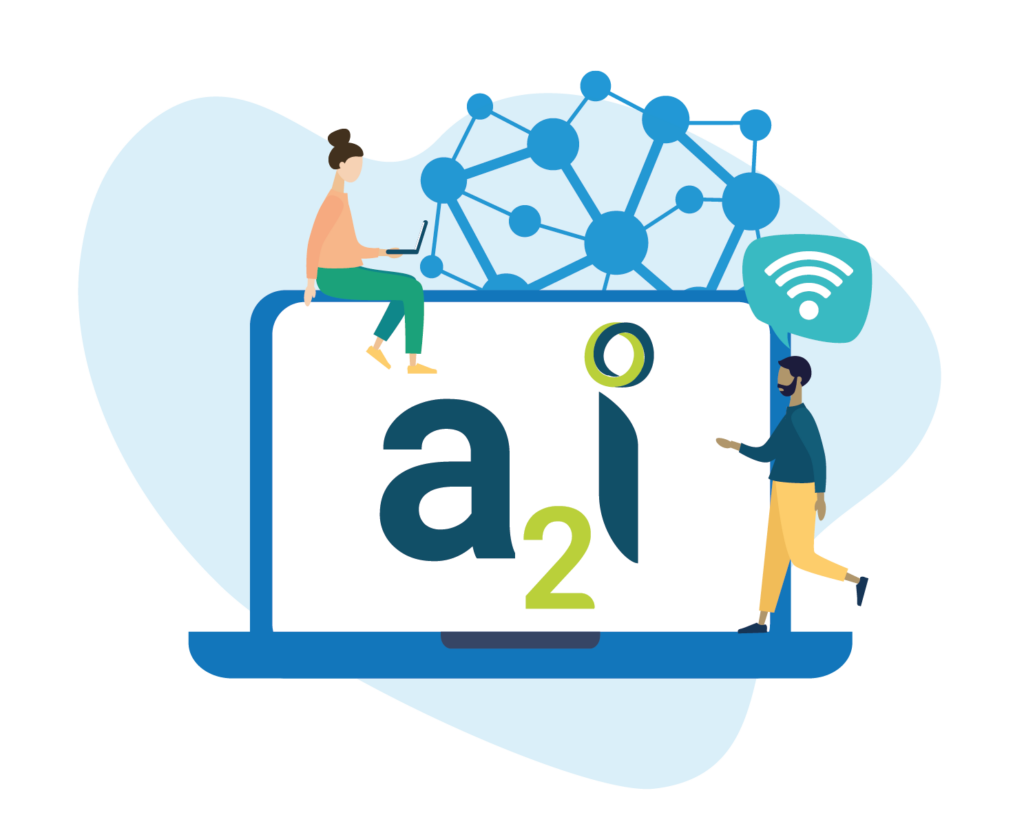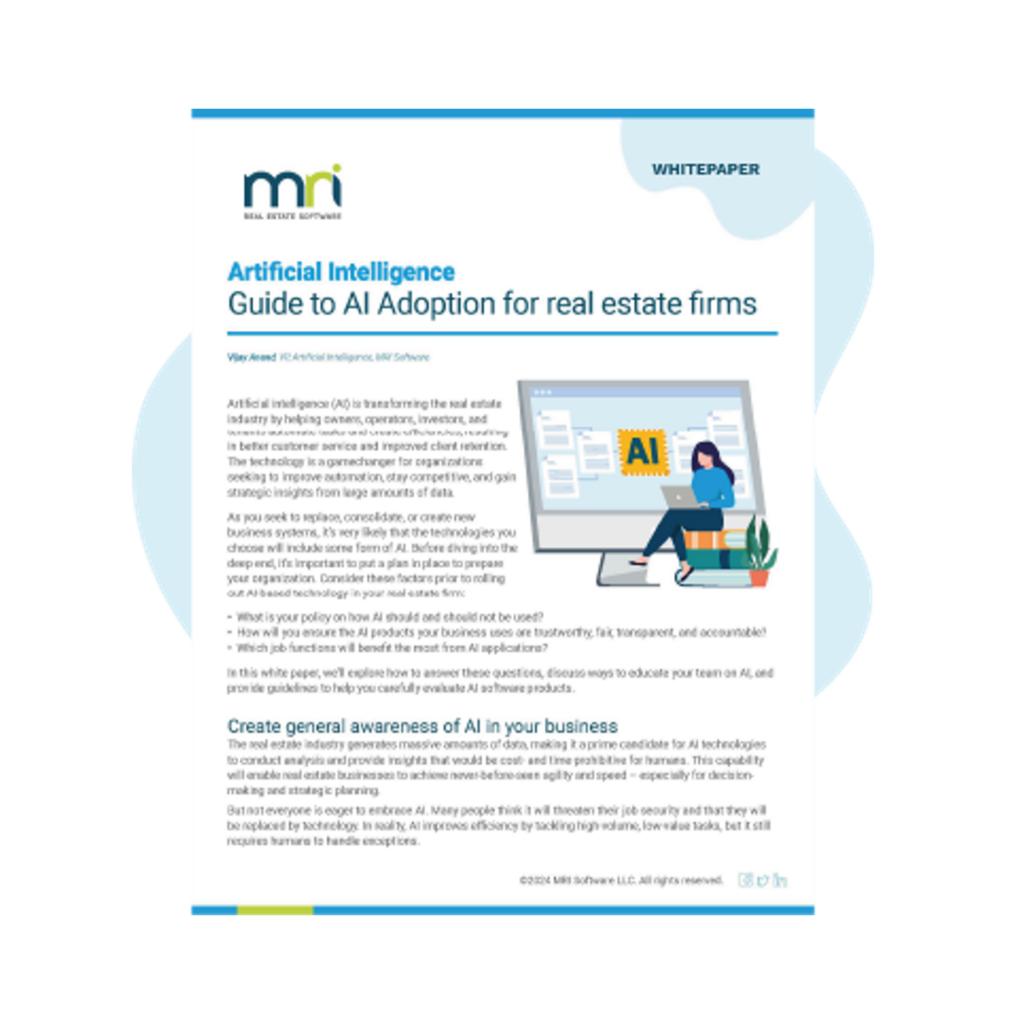Unlocking AI for Commercial Real Estate – Exploring key insights shared at Ascend 2024
In one of the many valuable breakout sessions held at Ascend this year, Dr Sarah Bell, MRI’s Director of Strategic Partnerships for APAC, led a panel discussion on the potential for AI technologies to transform the commercial real estate sector.
“Unlocking AI for Commercial Real Estate,” featured insights from speakers Has Fakira, Consultant in Innovation, Digital Transformation and Human-Centred Design at Five Words Consulting, and Tracy Ho, Property Technology Innovations Lead for Asia Pacific at JLL.
We’ve compiled some of the most significant insights and highlights from the session below.
Understanding AI: Breaking down the terminology
The panel session began by capturing the speaker’s perspectives on Artificial Intelligence and its applications. Sarah suggested that discussions about AI can be complex and that this can stifle broader understanding and constructive experimentation within the industry.
Has agreed that AI terminologies can often seem daunting. However, by breaking it down into simpler terms, namely AI, Machine Learning, and Generative AI/Large Language Models (LLMs), we can demystify the concept and make it more accessible for non-tech professionals.
“Whenever I mention generative Artificial Intelligence, I get a whole range of reactions. In simple terms, AI is a system that mimics human behaviour. It’s an umbrella term for something that’s been there for decades,” Has highlighted.
“What’s changed is computing power has increased, so it’s smarter than it used to be. Within Artificial Intelligence, there’s a branch called Machine Learning. (This refers to) machines that learn from past data to predict new things. Generative AI, which is what most of the hype is about, uses Machine Learning and LLMs to generate new content, like text, video and images.”
The human-centred approach to AI adoption
Tracy emphasised that balancing business and human needs is the key to effectively adopting and using AI.
AI implementation requires a dual focus on selecting the right technology and ensuring high adoption rates through human-centric approaches. In other words, “What is the real problem that we’re trying to solve with this and what’s going to impact our people the most?”
JLL has eagerly embraced AI technology with the sales team leveraging it to streamline the creation of floorplans and fit-outs for clients, and facilities managers exploring how AI can harness extensive historical data for predictive maintenance.
She said that part of this involves being open to experimenting with AI – or showcasing innovation with a wow factor that doesn’t always (at least in the short term) translate to a dollar value.
Using robotics applications in commercial real estate for cleaning, concierge or other applications is one example where AI offers great potential while still having operational limitations.
According to Tracy, projects like this with an indirect rather than immediate ROI can build a culture of innovation and experimentation within organisations, and provide substantial intangible benefits – like marketing impact, an improvement in internal morale and a way to attract top talent.
Enhancing decision-making with AI
Often the enthusiasm for AI is linked to its productivity-boosting capabilities. The panel explored how property professionals could push the envelope into broader use cases.
Has pointed to the idea of leveraging AI for better-quality data interpretation and provided two examples:
- AI’s ability to transform raw data into actionable intelligence; and
- Its role in removing bias.
“In the real estate industry, we’re all used to being given spreadsheets of data but what about the trends …. and (what if) you want to compare this office building to that office building? It’s not quick, and you’ve got to make sure it makes sense. It becomes a bit of a challenge,” he said.
“I’m working with a visualisation startup that has come up with a unique concept, and that is, to give the AI the raw data. It’ll give you the top four or five visualisations that bring that data to life and it’s super quick.”
Addressing unconscious bias
Reducing unconscious biases is another area where Has believes AI has the potential to improve decision-making quality.
“One of the distinct disadvantages of human knowledge work is the tendency to jump to biases. I’ve found that using Generative AI to identify themes that you probably wouldn’t have thought about because you’d already made your mind up subconsciously can help you reduce bias within a team. This is a big win for creating fair and equitable experiences for people,” he explained.
Commercial real estate as a frontier space for AI
Sarah asked the panellists whether advancements and investments in AI within commercial real estate can set the stage for broader applications across other real estate sectors.
“With commercial real estate – the scale of the buildings, of the dollars involved and of data as well – means that it could be the leading edge or frontier space for residential real estate to follow in,” she said.
Tracy agreed, saying, “I think the commercial sector is always going to have the bigger budgets …. especially for premium assets. Our fund and asset managers also tend to want to be in the technology game as well.”
Tracy believes there will be a trickle-down effect from commercial to industrial, retail and resi and that the successful integration of technology in commercial settings provides a roadmap for innovation in other property types.
“The build-to-rent market in Australia will be interesting to watch, for example. In America, McKinsey has done a study looking at like-for-like in build-to-rent precincts,” she said. “And the ones that were investing heavily in technology and the customer experience that is delivered by technology, are charging up to 50% premiums.”
The future of AI in CRE
Sarah wrapped up the session by asking the panellists to dust off their crystal balls and predict what is on the horizon for AI in commercial real estate.
Has believes the future lies in creating industry-specific GPTs.
“The large language models I talked about are general. They are frontier models. They use the information on the internet and billions of words of data go into producing them. I think it’s time to think about a corporate real estate model trained for, and available to, people in the industry,” he said.
The panel’s final observations were that guardrails for safe use are becoming increasingly important. This is especially the case in Australia, where – unlike other jurisdictions like the EU – there are no mandatory laws governing the use of AI.
One of Tracy’s recommendations is to conduct an audit. “Even if your organisation hasn’t fully embraced AI, chances are that people are already using it to draft emails, create workshop materials, or crunch data and IP. It’s crucial to understand how AI is being used and then establish appropriate internal policies to manage it,” she said.
AI for Real Estate
Discover how MRI Software uses AI to enhance automation, workflows, and decision-making.

Is your real estate business ready for AI technology?
Before embracing AI technology, it’s crucial to establish a strategic plan that balances its risks and benefits. In our latest whitepaper, ‘Guide to AI Adoption for Real Estate Firms’, Vijay Anand, MRI’s VP of Artificial Intelligence, offers insights on educating your team about AI and provides guidelines for carefully evaluating and rolling out AI-based technology in your organisation.
Guide to AI Adoption for Real Estate Firms
Is your real estate business ready for AI technology? Real estate technology leaders know that artificial intelligence (AI) brings unmatched opportunities for the industry. The technology is a gamechanger for owners, operators, investors, and tenants…

